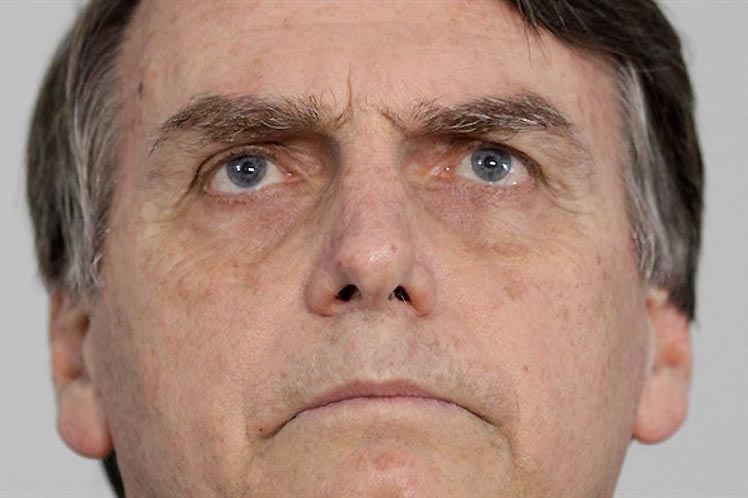Brasilia: Postponed from October to November 2020 due to the pandemic, the municipal elections held in Brazil constituted a gauge and the toughest political setback for President Jair Bolsonaro since he assumed power two years ago.
Spurred on by irresolute actions, the ex-military man broke with the Social Liberal Party (PSL), the same one that brought him to power in 2018, in the midst of a struggle for control of the Partisan Fund.
According to detractors, the far-right president wanted more space for himself and his descendants, without taking into account that the PSL had a structure, presidency and board of directors elected before his triumphal entry into the Planalto Palace, seat of the Executive Power.
During the first half of this year, he tried to unite his new political organization, Alliance for Brazil (APB), founded in November 2019, which, according to him, would have the objectives of fighting corruption and promoting Christian values, but it was shipwrecked.
?It is not easy to form a party these days. We are trying to create the APB, but if we do not succeed in March we will have a new option?, he admitted.
Without his dreamed of alliance, the former Army captain set out to support candidates in the municipalities, in which some 148 million Brazilians were empowered to elect mayors, deputy mayors and councilors of the 5,567 municipalities in the country.
Support was complicated for Bolsonaro by not having a party and a political base, and of the 13 mayoral candidates he supported, 11 were defeated and only two were elected between the two rounds on November 15 and 29.
However, after the results were released, the president downplayed his own efforts, shouting that attempts to support applicants amounted to ‘only four live broadcasts totaling three hours.
Based on the general figures, the center-right emerged as the great winner of a vote under the Covid-19 pandemic that forced the reinforcement of sanitary measures.
Bolsonaro-backed names posted a poor performance in the first round.
One of the most significant failures of his allies was that of the candidate for mayor of Sao Paulo, Celso Russomanno of the Republican party, fourth most voted and out of the November 29 ballot.
The mayor of Rio de Janeiro, Marcelo Crivella, of the Republican party and unconditional of the head of state, also skated in the second round.
The ultraconservative bishop of the Universal Church of the Kingdom of God lost office and reelection to Eduardo Paes, of the Democratic Party.
During the electoral campaign, Crivella strengthened his link with Bolsonaro to try to reverse the polls that were not favorable to him, but it did not work.
Apart from the prelate, the former official’s last hope was Wagner Sousa Gomes, who also capsized in Fortaleza, capital of the northeastern state of Ceará, at the hands of candidate José Sarto, of the Partido Democrático Trabalhista (PDT, center-left).
Despite the poor electoral results, according to political scientist Flávia Biroli, from the University of Brasilia, “that does not mean that in 2022 (presidential) there will not be a fusion of Bolsonaro with the right-wing parties.”
REASONABLE PERFORMANCE FROM THE LEFT
For the second round of the municipal elections, the Workers’ Party (PT) presented candidates in 15 of the 57 cities in which there was another round, however, it could not take office in the capital of any state.
In this regard, the president of PT, Gleisi Hoffmann, considered that the political organization managed to ‘stop the bleeding’ and stay at the same level as in the last district jousts in 2016.
She described the action as sensible when recalling that the party suffered major attacks since 2013, including a strong demoralization campaign, which made electoral developments even more difficult this year.
I would say, she said, that the elections for the PT were at a reasonable level of what we could face all that time with adversity.
She argued that because of the attacks it is not easy to recover the image and the positioning occurs in jumps. She recovers in the process, the dispute and the dialogue.
Hoffmann acknowledged that the PT suffered a series of political defeats in recent years that are not minor.
She recalled the parliamentary judicial coup against Dilma Rousseff in 2016 that removed her from power, the imprisonment of former president Luiz Inácio Lula da Silva, the attacks that mark the party as a thief and the question of values set against it.
?All this still has echo in society. We faced it, we did the discussion, but it has a mark?, she insisted.
For the deputy, the PT suffered an electoral defeat by not being able to elect any mayors in the Brazilian capitals, but even so it obtained a good number of candidates in the second round and in the municipalities of other large urban centers.
“I think the party may have had an electoral defeat, but I don’t think it was a complete policy … We cannot rush into the evaluations, nor think that we are fine, but neither think that the PT was defeated, destroyed?, she reflected .
He remarked that it is obvious that the municipal election puts the forces at stake on the board, some trends, but they are not decisive for a national competition.

